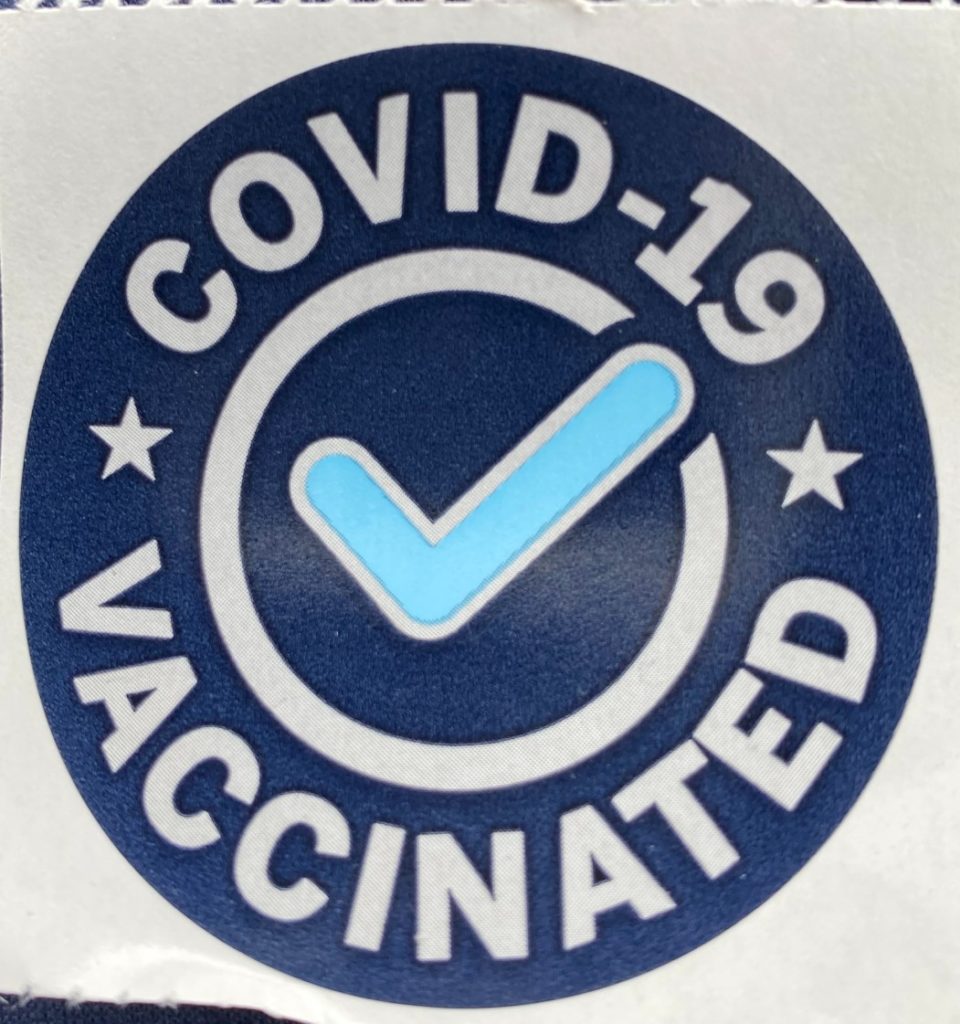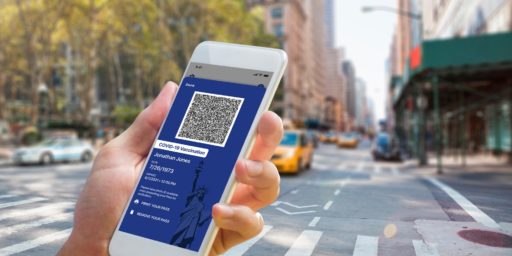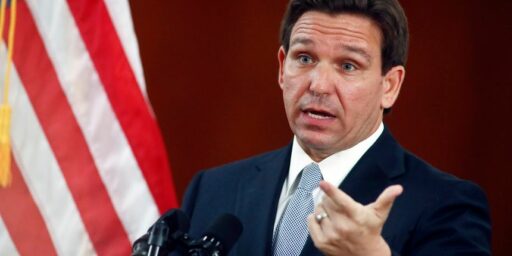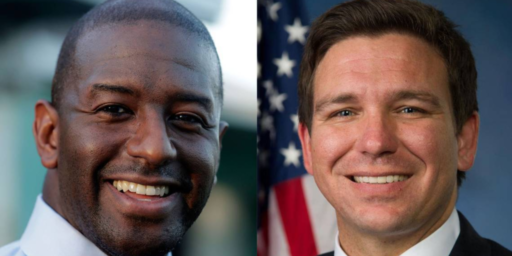Additional Thoughts on Vaccine Passports
It makes sense for large-scale venues, yes? But making sense is not the issue.

James Joyner’s post on Florida Governor DeSantis’ preemptive strike on vaccine passports inspires me to continue that conversation. So, the first concrete discussion of an actual vaccine passport is New York’s Excelsior Pass (which makes me hear Stan Lee’s voice, I must confess). It is described thusly in USAT: New York launches nation’s first ‘vaccine passports.’ Others are working on similar ideas, but many details must be worked out.
The first-in-the-nation certification, called the Excelsior Pass, will be useful first at large-scale venues like Madison Square Garden. But next week, the pass will be accepted at dozens of event, arts and entertainment venues statewide. It already lets people increase the size of a wedding party, or other catered event.
The app, championed by Gov. Andrew Cuomo to support the recovery of industries most affected by the pandemic, is funded by the state and available free to businesses and anyone with vaccination records or test results in New York.
As they would with an airline boarding pass, people will be able to prove their health status with a digital QR code – or “quick response” machine-readable label. They’ll need to download the Excelsior Pass app, enter their name, date of birth, and ZIP code, and answer a series of personal questions to confirm their identity. The data will come from the state’s vaccine registry and will be linked to testing data from a number of pre-approved testing companies.
So, I have to admit, this sounds like a pretty good idea to me, especially as it pertains to large venues. What better way to allow sporting events, concerts, trade shows, conferences, etc. to reopen at max capacity while also stopping the spread of the virus? It would also have the effect of helping to incentivize vaccinations.* Indeed, the sporting venue issue alone makes me question Ron DeSantis’ intelligence on this matter. After all, Florida has three NFL teams, two NBA teams, two MLB teams, and a host of major college sports. Oh, and in case anyone was wondering, Florida’s number one industry is tourism. One might be aware, for example, of the crowd-based economy in Orlando.
It would seem to me that a desire to get back to full business would be a huge incentive to at least take this notion of a vaccine passport seriously.
But, let’s not discount that the Excelsior Pass is being touted in New York by Andrew Cuomo.** DeSantis wants to be the anti-Cuomo in many ways, so it is not surprising that he is opposing this Yankee notion. Further, DeSantis has national aspirations and he knows he can make a national splash by busing this issues as a partisan wedge.
(Oh dear, he is going to talk about partisanship again, isn’t he?).
To add to an ongoing conversation, I think what we are seeing here is partisanship in action. Meaning, that party-linked views on a given broad topic are influencing individual opinion (which sums to mass opinion) and also leads decision-makers, like DeSantis, to stake out political space around the topic.
To pause for clarity, as I think that this topic causes reactions that seem to ignore definitions. Partisanship exists when one has a positive mental association with a party (or a negative one for another) which acts as a mental filter/sorting mechanism. If one identifies as a Republican, one is more likely to have a positive response to other self-identified Republicans and to be more amenable to Republican-oriented narratives. And, of course, the converse is true. Partisan affiliation also likely influences one’s personal interactions, especially on politics, and also almost certainly influences one’s media consumption. If one votes Republican, talks politics with other Republicans, and consumes Republican-friendly news and commentary sources, all of this is becomes a self-reinforcing relationship. And, of course, the same is true about Democrats, etc.
The more strongly one is affiliated, the stronger the filtering.
This is not to say that partisanship is a mono-casual, universal variable nor that rationality goes out the window along with personal responsibility. But is also true that no one functions wholly apart from such influences.
It is undeniably true that Trump made the virus itself and public health responses to it into a partisan issue back in early 2020. It was a position that he largely fueled until he left office. This positioning was reflected, therefore, in the media. Sympathetic media championed his skepticism about public health accommodations, such as masks, as well as amplifying his downplaying of the severity of the virus. Meanwhile, when non-sympathetic media were critical of Trump, this was just proof to many supporters that the “fake news” (if not the “enemy of the people”) were out to get him, which meant that many Republicans were more likely to see neutral, fact-based reporting on the virus as actually being partisan (because it was in opposition to their president’s views).
Throw in a little “personal freedom” into the mix about mask-wearing and group-gathering and it is not hard to see how this gets hyped into a symbolic, battle between distinct sides (and in an election year, no less). And, it should be remembered, there were real, personal consequences for many rules linked to public health considerations. Weddings were canceled. People were unable to attend the funerals of loved ones. Many businesses very much suffered because of lock-downs and other public health provisions. Jobs and income were lost, etc.
All of that is not hard to use as political fodder. And if one side is saying “wear masks, stay away from loved ones, and close your business” and the other is saying it is just the “sniffles” and it will be gone soon, while at the same time visibly eschewing simple activities like mask-wearing and social distancing, then the partisan nature of this topic should be pretty clear.
And, I am not saying that all Republicans were in lock-step with Trump, whether we are talking individuals and whether they willingly wore masks of not, or even politicos. But, the aggregate behavior is (and was) clear.
I remember having this argument early on (so early that I remember responding to comments on a post from an airport). The post, Coronavirus Has Been Politicized to Dangerous Effect, was by James Joyner on March 7, 2020, which was on the cusp of various degrees of state-level pandemic orders on things like schools going virtual, and certain businesses (restaurants and retail) being closed. I wrote a follow-up post on April 2, 2020 on that topic: Partisan Effects on Response to Covid-19 (and know that the topic has come back time and again over the last year or so).
Indeed, now that I think back, the interchange on James’ post led to an e-mail back and forth with a commenter who was extremely critical of the whole notion of partisanship as a frame. I would argue that the last year has clearly demonstrated the degree to which response to the pandemic has been decidedly shaped by partisanship.
While vaccine passports may be the latest battleground, we know that the vaccine itself is being viewed by the population through partisan lenses. Note this story from February by Harry Enten at CNN: Covid-19 vaccine hesitancy is splitting dangerously along partisan lines
Take a look at polling from Axios/Ipsos and Gallup on coronavirus issues. They have polled frequently on the topic in recent months.In an average of Axios/Ipsos polls taken in January and February, 74% of Democrats said they’d either been vaccinated, or were extremely or very likely to get vaccinated as soon it’s available to them. Just 51% of Republicans said the same thing. Independents were in the middle of these two groups at 61%.
When Gallup asked respondents whether they would agree to get vaccinated if the vaccine were available to them right now, the partisan gap stood at 40 points (91% for Democrats and 51% for Republicans) in their most recent poll.
Let’s note that, as I snarkily underscored above, there is a rational, business-based reason for DeSantis to support vaccine passports in Florida. But DeSantis is thinking about running for president. He is, therefore, more than willing to exploit national partisans’ sentiment (especially that of hardcore MAGAist primary voters) on things like the vaccine passport (and the virus in general) to his own state’s economic detriment. (And, for all I know, he has sincere beliefs on the subject, but he probably has sincere beliefs on the value of full stadia and amusement parks).
His incentives are shaped by the pathway he knows he has to tread, i.e., the GOP primary process where tapping into deep partisan identity and feelings is the ticket. All of this, in fact, intersects with my broader discussion of political institutions and the incentives and disincentives they create. Ambition for DeSantis (and really, anyone in his position) is to look beyond simply the interests of his state to the broader national narrative of the GOP and, especially, the relevant sub-narratives animating key pockets of voters who will turn out for the primaries in 2024 (and given money until that time).
*For example, I have an acquaintance who is vaccine-hesitant, but since this person wants to travel internationally soon, they will get the vaccine because it will be required where they want to go. A lot of people who might not get the vaccine will do so if it means doing something they want to do faster than would otherwise be the case. (Even something as small as free donuts, perhaps).
**While not relevant to this discussion, let me state that yes, I think Cuomo should resign, but that’s it own conversation.






I appreciate the thought you and James have put into this. For me, this is a binary issue. Yes, masks are an annoyance and pain. No, I don’t want me or those around me to be ill. Therefore, since #2 outweighs #1, I wear a mask. I bemoan the maladroit governor who inherited her position on the left coast, but am equally appalled at the caliber of weasels running things back on your coast.
I agree. DeSantis’ campaign for the R nomination for POTUS has begun. Time will tell if he’s making that same mistake many generals make when fighting the new war: Fighting the previous one. Two years from now it’s possible Trump and Trumpism will be viewed as a loser by the faithful, if only tacitly so.
@dazedandconfused:
Trump may be out of favor, but I’m sure Trumpism will still be all the rage under whatever new “hero” has replaced him
@Stormy Dragon:
All but certainly, but I wonder about that ‘focus group” fallacy, wherein people’s responses are influenced by being within a group so the information obtained is faulty. Will they say Donald Is Our Savior to everybody who asks but when alone with their ballot check the box for a Romney?
The Democratic party ought to begin a widespread a campaign against dehydration.
@Stormy Dragon:
Earlier this week, someone wrote an interesting piece about how Trumpism can’t really flourish without Trump himself. I can see the author’s point: How can Trumpism appeal without Trump’s unique blend of stupidity, cupidity, churlishness, ignorance, and malevolence animating it?
@CSK:
Depends how broadly you define “Trumpism.” If you think the appeal of “Trumpism” is pandering to biased white people and Fundamentalist Christians it will be around a long time.
You are aware of Fox News and OANN, no?
GOP prioritizes being the opposition party. With Democratic PTB pushing vaccination, GOP will naturally oppose.
Saw someone a few days ago point out that Republicans actually believed COVID was no big deal, that it was being blown out of proportion to hurt Trump, and that it would fall out of the news after the election. Why did they believe this? Because that’s what they did to Obama on Ebola.
@CSK:
Trumpism was there in the Republican party long before Trump showed up. The particular aesthetic trappings associated with him may not last past him, but the “culture” of Trumpism will still be there.
@gVOR08:
Amazing they got just about every country in the world to go along with this deception merely to hurt the Grand Orange Ass.
@Stormy Dragon:
“Trumpism was there in the Republican party long before Trump showed up.”
True. John Boehner’s memoir looks like quite a read on that score. The first paragraph of the excerpt:
“In the 2010 midterm election, voters from all over the place gave President Obama what he himself called “a shellacking.” And oh boy, was it ever. You could be a total moron and get elected just by having an R next to your name—and that year, by the way, we did pick up a fair number in that category.”
@CSK:
@charon:
I remain eternally thankful that he no longer has his Twitter megaphone. Through all 4 years of his Presidency, it was depressing knowing that even if he lost the election, we were gonna be stuck with his personal brand of evil permeating the internet. The guy is never gonna shut up, not til he’s dead, but at least he’s been de-platformed.
@charon: @Stormy Dragon:
Without Trump to lead them, the Trumpists may well recede into a place of smaller significance. We can hope. They need a leader, and no one–so far–seems to be able to take Trump’s place.
Original story in the NYT, here is a clif notes version:
https://nymag.com/intelligencer/2021/04/trumps-campaign-scammed-donors-auto-checked-box.html
…
…
My idiot brother will be getting a vaccine because the Democrats are going to make it impossible to do anything without one. He’s more than a little convinced that there will be roadblocks. Literal roadblocks.
I’m not sure which is worse — seriously entertaining the notion that there’s going to be a police state with covid ghettos for the unvaccinated, or immediately submitting to the police state before its even formed.
I’m not saying anything. Not until he gets the vaccine.
Did I mention he’s an idiot?
The discussion overlooks an important point: when the right decides to make an issue partisan, it invariably chooses the side which many people will instinctively find more appealing. For example:
– There is no evidence smoking causes cancer. Therefore smokers can stop worrying – which is exactly what they want to hear.
– Global warming is a hoax. Therefore people can stop worrying about cutting down on energy use, which is exactly what they want to hear.
– Blacks aren’t disadvantaged; they’re simply unwilling to lift themselves out of poverty. Therefore ‘systemic racism’ is a nonsensical concept, which is exactly what lots of white people want to hear.
And now, COVID-19 is no worse than the flu. Therefore people don’t have to follow those stupid inconvenient restrictions, which is exactly what they want to hear.
Right-wingers always take the populist side of social issues, purporting to be the party fighting for “common sense” against the bureaucrats and academics who want to make people do things they don’t want to do. It means that in embracing ignorance and bigotry as core values, the Trump Republican Party starts with a natural advantage whenever evidence-based policies would require voters to do something they’d prefer to avoid.
@Ken_L: guns aren’t the problem, why, you’re a proud, responsible, citizen, your guns have never hurt a fly. A gun isn’t a weapon, it’s just a tool*. The real problem is a few crazy people over there, they should do something about that.
*(A verbatim sentence I was told by an idiot relative 13 years ago.)